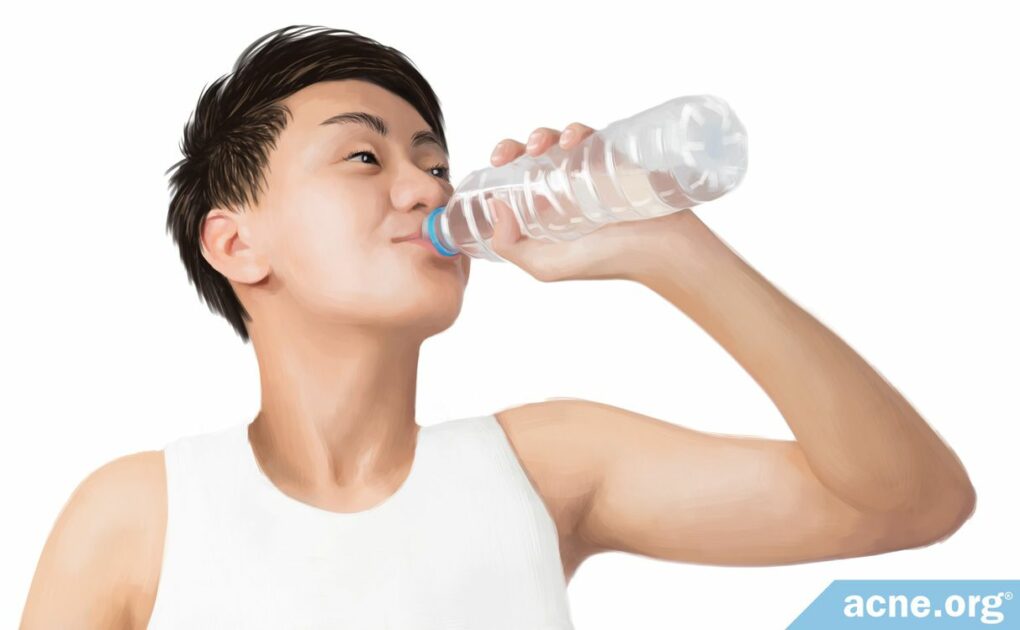There Is No Evidence That Drinking a Lot of Fluids Affects Acne One Way or the Other

The Essential Info
You’ve probably heard that drinking a lot of water is important if you want clear, youthful, and radiant skin. You’ll also hear this advice professed when it comes to keeping the skin clear of acne. However, research does not support this claim.
It is true that for people who drink inadequate amounts of water, increasing fluid intake can hydrate the skin. However, for those who already drink enough fluids, the body will just get rid of any additional water without any effect on the skin.
When it comes to acne, no one has looked directly at how fluid intake affects breakouts. However, some indirect evidence suggests that keeping the skin fully hydrated:
- [+] Improves wound healing, which may help acne lesions to heal faster
- [+] Increases absorption of topical acne treatments, which may slightly improve acne
- [-] Promotes the growth of acne bacteria in the skin, which might actually worsen acne
On balance, it looks like drinking more fluids neither improves nor worsens acne. However, more research is necessary to definitively answer this question.
How do you know if you are already drinking enough? Your body is perfectly primed to tell you. It’s as simple as this: If you feel thirsty, drink. When you’re no longer thirsty, stop. That’s it. Our bodies have a perfectly evolved mechanism to tell us when we need more fluids, called thirst.
Warning For People with Impaired Kidney Function: Excessive water intake can be dangerous if you have impaired kidney function, so be sure to ask your doctor before you start increasing your fluids.

The Science
- Does Hydrating Your Skin Help with Acne?
- How Much Water Does the Body Need?
- The Body Makes Sure It Has the Water It Needs
- If You’re Dehydrated, Drinking Extra Water Might Make Your Skin More Hydrated
- Is it Possible to Drink Too Much Water?
- What about Caffeinated Beverages?
- What about Alcoholic Beverages?
- The Bottom Line
According to many articles and conventional wisdom, drinking a lot of water every day can boost your health in all sorts of ways, including giving you radiant, clear skin. These days, many people bring a sleek water bottle along wherever they go.
The theory behind hydrating for clear skin is simple: Water makes up almost two-thirds of an adult’s body, and as the largest organ in the body, the skin harbors about 20% of all the body’s water. It seems logical that if you drink more water, the extra liquid will go to your skin, making it healthier and better able to stay clear.
However, in reality, things are more complicated. The body tightly regulates its water balance, so drinking more water does not automatically result in more hydrated skin.
When it comes to acne, there is no evidence that drinking more helps. Let’s take a look at the evidence.
Does Hydrating Your Skin Help with Acne?
No studies have directly looked at whether drinking more water improves acne. However, we do know a lot about how acne develops, and we have some research on how hydration affects the skin. Putting together this information, we can infer that keeping acne-prone skin fully hydrated will:
- [+] Improve healing of acne lesions: Acne lesions, medically speaking, are small wounds. Any wound heals better in a moist environment, and acne lesions are no different.
- [+] Increase absorption of topical acne treatments: Water makes the skin more porous, so hydrated skin may be better able to absorb topical products used to treat acne.
- [-] Promote the growth of acne bacteria in the skin: Acne bacteria like a moist environment, so hydrated skin might allow these bacteria to multiply and thus actually worsen acne.
In other words, maintaining adequate hydration may improve acne in some ways while worsening it in other ways. On balance, it may not make a noticeable difference one way or the other.
If you want to learn more about the research behind this conclusion, expand the section below.
How hydrating the skin impacts acne: The full scoop
Let’s take a look at the evidence that suggests hydrating the skin may worsen acne in some ways and help with it in other ways.
Evidence that hydrating the skin promotes the growth of acne bacteria

A study published in the journal MicrobiologyOpen in 2017 looked at how skin hydration impacts the skin microbiome–in other words, the types of microscopic organisms like bacteria living on the skin. The researchers examined 30 healthy Korean female volunteers. The scientists divided the volunteers into two groups, the high hydration group and the low hydration group, based on how hydrated their facial skin was at the beginning of the study. All volunteers then received a moisturizer to apply to their faces twice a day for 4 weeks. After 4 weeks, the researchers looked at the microorganisms on the facial skin of the volunteers. They found that the people in the high hydration group had more C. acnes as well as other bacteria on their skin compared to the low hydration group. C. acnes is the type of bacteria that can make acne worse when it overgrows.1
This study suggests that highly hydrated skin may be a ripe environment for acne bacteria to overgrow and worsen acne. The researchers wrote, “Acne development may occur more easily in facial skin with a high hydration level.”1
At the same time, the scientists noted that hydrated skin may also house more beneficial bacteria that may help keep C. acnes in check. In other words, it is too early to jump to the conclusion that hydration definitely worsens acne. For that, we need to see a study that directly compares acne in people with high and low hydration levels.
Evidence that hydrating the skin improves the healing of acne lesions
No one has looked specifically at how hydration affects the healing of acne lesions. However, many studies have shown that wounds in general heal better in a moist environment. Medically speaking, acne lesions are also wounds. From the 1960s onward, studies have found that hydrated wounds heal faster than dry wounds because new skin cell grow faster in the presence of moisture.2
Evidence that hydrating the skin increases the absorption of topical acne treatments
Water is a so-called skin permeation enhancer. In plain language, this means that water makes the skin more porous. Therefore, medications applied to the skin can more easily penetrate hydrated skin and reach their target. This goes for any medications, including topical medications for treating acne. We can therefore expect that hydrated skin will respond to topical treatment better than dry skin.3,4
How Much Water Does the Body Need?
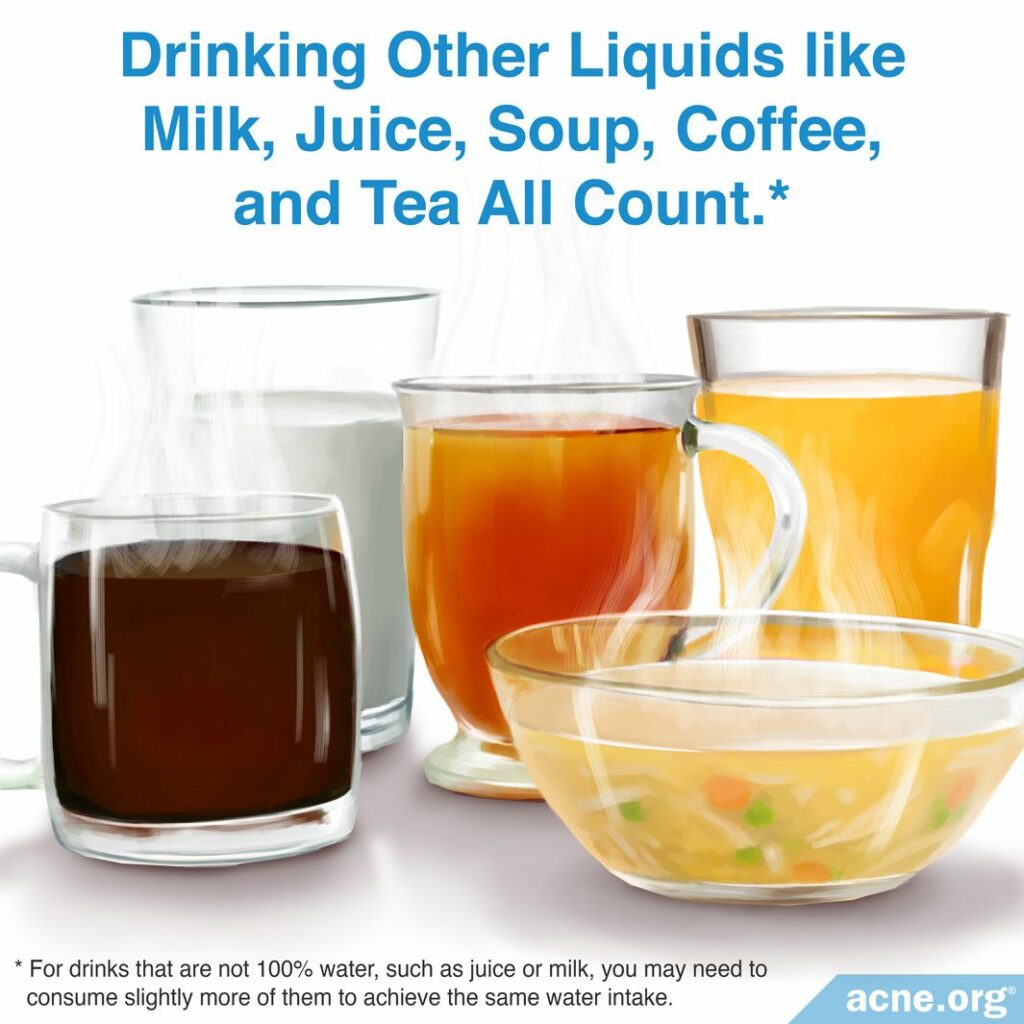
To help people determine whether they are drinking adequate amounts of water, health organizations in different countries have created some guidelines. These recommendations are based on the amounts of water the human body needs to function properly. For example:
- USA: The Dietary Guidelines for Americans recommend a minimum of 3.7 liters (about 15.5 cups) of water per day for men and 2.7 liters (about 11.5 cups) for women.
- Europe: The European Food Safety Authority recommends a minimum of 2.5 liters (about 10.5 cups) of water per day for men and 2.0 liters (about 8.5) for women.5
These are only guidelines, and depending on your body and activity level, you may not need more or less than this. Trust your body. Evolution has ensured an exquisite mechanism to know when you need to hydrate, called thirst. Drink when you are thirsty and you’ll be good to go. It’s as simple as that.
You can hydrate by drinking pure water or other liquids, such as juice, soup, milk, coffee, or tea. For drinks that are not 100% water, such as juice or milk, you may need to consume slightly more of them to achieve the same water intake.6
The Body Makes Sure It Has the Water It Needs
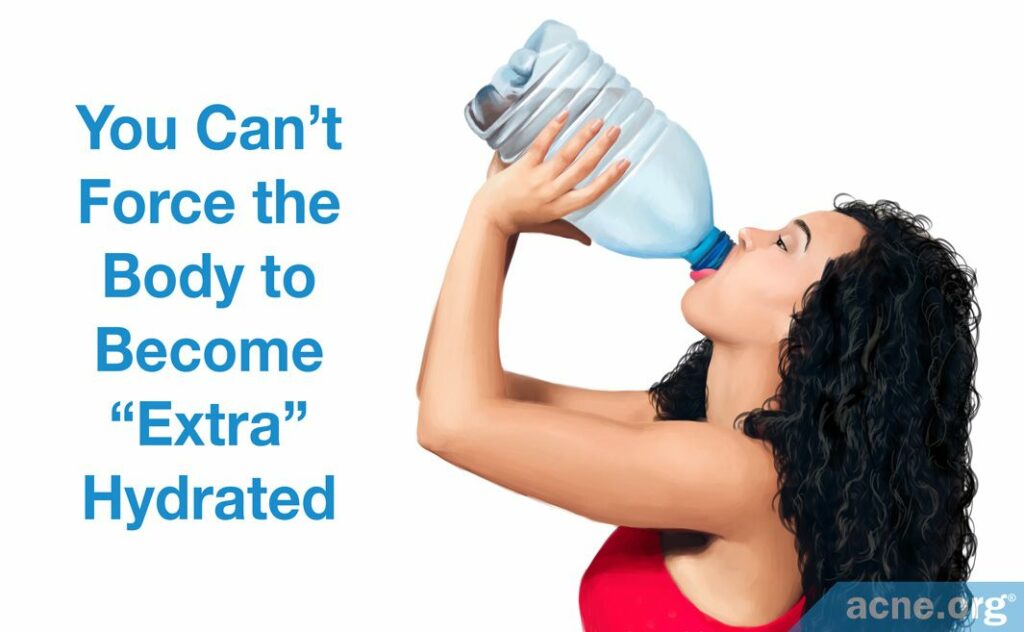
The body is so good at regulating its water content that the volume of water inside our bodies fluctuates by less than 1% over a 24-hour period.7 To achieve this, the body carefully balances the water it loses with the water it takes in.
If we lose a lot of water through sweat, our bodies act to replenish the water by making us thirstier and producing as little urine as possible. On the other hand, if we drink too much water, our bodies block our thirst signals and produce a larger volume of urine.
What this means is that you can’t outsmart your body. If you try to drink more than your body needs, it will just flush the excess water out over the course of the day. In other words, if you’re already drinking enough, hydrating more will just make you run to the bathroom more often, but it probably won’t do much else.
All about how the body maintains water balance
Our bodies have a few ways of gaining water:
- Drinking fluids: Consuming fluids is where we get most of our water.
- Eating foods that contain water: Eating water-containing foods also makes up a significant part of our water intake. Some examples of foods that are high in water content include milk, cantaloupe, strawberries, watermelon, lettuce, cabbage, celery, spinach, and cucumbers/pickles.7
- Producing water: Our bodies actually make about a cup of water per day during internal chemical reactions.8
Likewise, our bodies lose water in several ways:
- Producing urine: Under normal conditions, the body gets rid of excess water through urine. However, even during dehydration, the body has to sacrifice some water to make urine in order to remove unwanted minerals, toxins, and other substances from the body.
- Sweating: The body loses water through sweating in order to regulate body temperature.
- Breathing: The body also loses some water every time we breathe in and out.
- Producing feces: The body has to use a small amount of water to moisten feces.8
The body maintains water balance in the body mainly by controlling only the main input of water, which is our drinking behavior, and the main output of water, which is the urine we produce:
- If the body lacks water: It makes us feel thirstier and produces urine that is more concentrated (less watery).
- If the body has excess water: It makes us feel less thirsty and produces urine that is more dilute (more watery).
The other factors that affect our water balance, such as how much water we get from food and how much we sweat, depend on the environment and the weather and are outside the body’s control. The body simply adapts to these gains and losses of water by adjusting how much we drink and how much urine we excrete.
How the body controls thirst and the amount of urine we produce: The details
Your body knows when it lacks water because special cells in your brain called osmoreceptors constantly monitor how hydrated you are. If these cells detect dehydration, they try to restore water balance by triggering:
1. A thirst signal in your brain, which makes you look for water to drink.
2. The release of a hormone called ADH (antidiuretic hormone) from the brain, which tells the kidneys to use less water for making urine.
3. The release of another hormone called aldosterone from the adrenal glands (glands on top of the kidneys), which tells the kidneys to take back as much water as possible from urine that’s already been produced.8
On the flip side, if the osmoreceptors in your brain notice that you have consumed too much water, they will trigger the opposite effects:
1. Blockage of thirst signals in your brain so you will no longer want to drink.
2. Suppression of ADH, causing the kidneys to use more water to make urine.
3. Suppression of aldosterone, causing the kidneys to make urine more dilute.8
So when it comes to your water balance, your body is the boss. Having said that, you can still make an effort to drink more water even when you do not feel thirsty. The research is mixed on whether this will work to make your skin more hydrated. Let’s take a closer look, but as you read, remember that we don’t know whether extra hydration in the skin will improve or worsen acne.
If You’re Dehydrated, Drinking Extra Water Might Make Your Skin More Hydrated
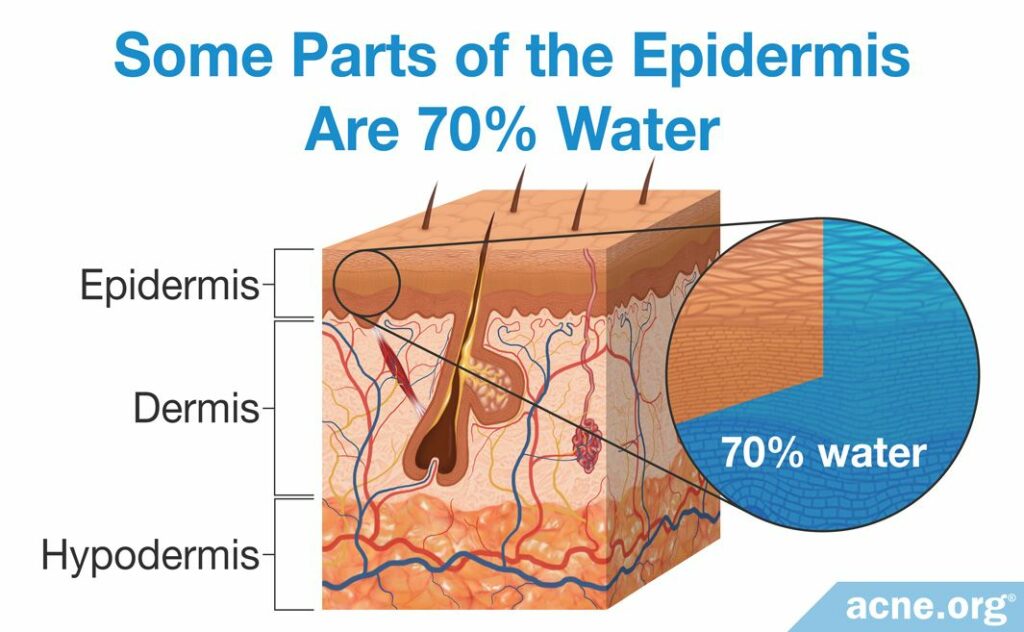
After you drink water, your body distributes that water to the various organs in a fixed manner. About 1/5 of the water goes to the skin, where most of it ends up in the outer layer of the skin called the epidermis.
Some parts of the epidermis are actually 70% water.2
Therefore, you might expect that if you increase your water intake, a sizable chunk of the extra water will end up in the epidermis. In reality, things are not so cut and dry (no pun intended).
Three studies have looked at how increasing your water intake impacts the skin.5,9,10 Here is the take-home message from these studies:
- If you are currently drinking too little water, drinking more will likely make a difference: All three studies agree that if you up your water intake to meet the daily requirements, more water will go to your skin, making it thicker and more hydrated.
- If you are already drinking enough water, drinking more might not do much for your skin: The studies disagree on whether chugging even more than the recommended daily amounts will have any effect on the hydration of your skin. One study found that the extra water does make the skin even more hydrated, while another study concluded that it makes no difference to the skin.5,9
Expand the drawer below if you are curious to learn more about these three studies.
Drinking extra water might make your skin more hydrated: The full scoop
Study #1
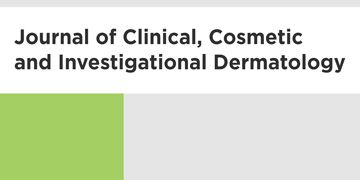
This study was published in 2015 in the Journal of Clinical, Cosmetic and Investigational Dermatology. The participants were 49 healthy women between the ages of 22 and 34. The researchers asked these women to drink 2 liters (about 8.5 cups) of extra water every day in addition to their normal intake. It is important to note that most of the women were consuming enough water per day to begin with.
Still, after one month of drinking 8.5 cups of extra water daily, the amount of moisture in the women’s skin increased by 25-41%. The largest change occurred in women who started with the lowest water consumption, but even women who routinely drank more than the recommended daily amount still benefited from drinking even more water every day. The study authors wrote, “These results seem to confirm that higher water inputs in one’s regular diet might positively impact [the] skin…in particular in those individuals with lower daily water consumptions.”5
In other words, if you up your water intake, some of the extra water will indeed end up in your skin, making it more hydrated.
Study #2

This study was published in 2007 in the International Journal of Cosmetic Science. The participants were 67 women and 26 men between the ages of 18 and 60. The researchers asked these participants to drink 2.25 liters (9.5 cups) of water every day for a month. The study took place in Europe, where 2.25 liters is above the recommended daily amount for women and just under the recommended daily amount for men. The researchers measured the participants’ skin thickness at the beginning and end of the study. Thicker skin indicates higher hydration.9
Surprisingly, the researchers found that after one month, skin thickness failed to increase.9 In other words, making sure to consume a lot of water daily failed to make the skin plumper and more hydrated.
This result is at odds with the previous study, which found that drinking extra water did make the skin more hydrated. However, the researchers did agree on one thing. They found that for the participants who had consumed too little water per day before the start of the study, increasing their water intake did make their skin thicker.9 In other words, like the previous study, this study shows that if you are routinely not drinking enough, drinking more water can make a difference to your skin.
Study #3

This study was published in 2018 in the Journal of Skin Pharmacology and Physiology. The participants were 40 nursing home patients aged 65 or older, 65% of whom were women. Most of these seniors were drinking too little water per day. The researchers tracked the seniors’ water intake over three days and then took measurements to assess skin hydration. They found a relationship between water intake and hydration of the facial skin. In other words, the seniors who drank more water per day had better-hydrated facial skin.10
Again, we need to keep in mind that these people were falling short of the recommended daily water intake. Just like the other two studies, this study shows that if you are drinking too little water, drinking more can make your skin better hydrated.
As we have seen, if your water intake is too low, drinking more water may be a good idea, though it probably won’t make any difference to your acne.
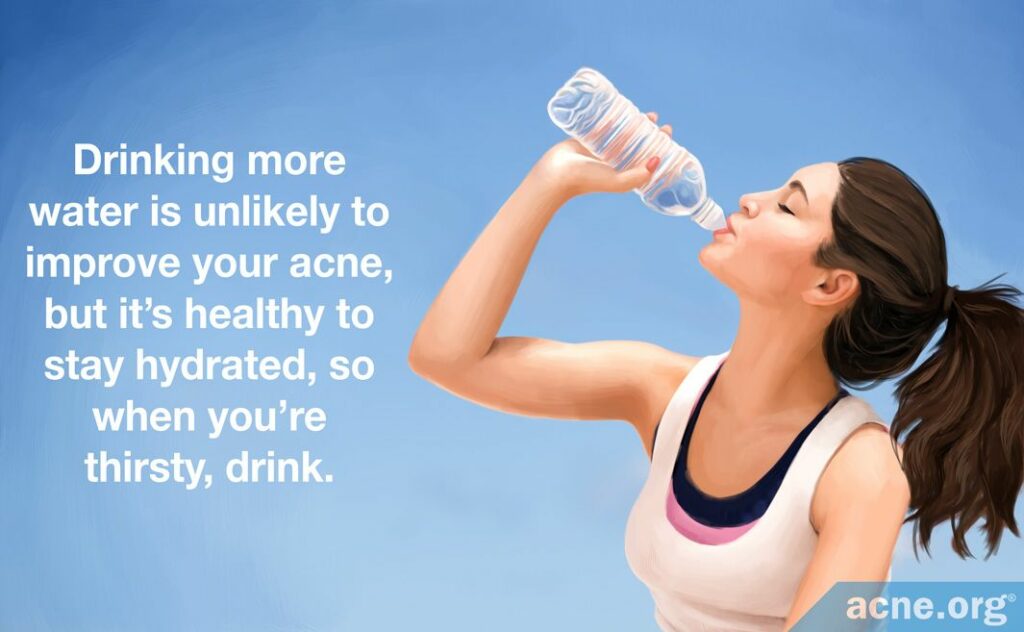
Is it Possible to Drink Too Much Water?
It is possible to overdose on water, which can lead to electrolyte imbalances and death, but this is extremely rare and almost always occurs only from water drinking contests during events like hazing at fraternities (beware! don’t do this!) or long periods of exercise combined with excessive fluid intake. In other words, just attempting to increase fluid intake to see if it helps your skin won’t cause you to overdose.
However, people with impaired kidney function need to be careful. Their kidneys cannot regulate water balance in the body, so the extra water can build up. Some of the excess water may flood into brain cells, causing them to swell up (so-called brain edema), which can result in death. If you have kidney problems, err on the side of caution and avoid drinking more than the recommended daily amounts.
What about Caffeinated Beverages?
If a large part of your daily water intake comes in the form of coffee, tea, cola, or other caffeinated drinks, you may be concerned about the dehydrating effects of these drinks. Let’s take a look at some research suggesting that you might not need to worry about this. [Side note: Drinking sugary soda is probably not ideal for acne.]
The dehydrating effect of caffeinated drinks may be negligible
Theoretically, caffeine can dehydrate the body in two ways:
- It stimulates the kidneys to lose more water in urine.
- It irritates the bladder, creating an urge to urinate.11
However, one study suggests that for a healthy person consuming several caffeinated drinks a day, the dehydrating effect of caffeine might be negligible.
In the study, 18 healthy adult men were given different combinations of water and various caffeinated drinks on 4 different days, keeping the total amounts of liquid the same each time. The researchers then tested how hydrated the men were after each combination of drinks. They found that the exact combination of drinks made no difference. The men were equally hydrated whether they had consumed some caffeinated drinks or only non-caffeinated drinks. Therefore, the researchers concluded that it is fine to consume caffeinated beverages as part of your recommended total fluid intake.12
However, it is important to keep in mind that the study was supported by a grant from The Coca-Cola Company, which may have biased the findings.
Expand to reveal details of study

This study was published in 2000 in the Journal of the American College of Nutrition. The participants were 18 males aged 24 to 39. On four separate occasions, each participant consumed one of the following combinations of drinks:
1. Water only
2. Equal amounts of: water + caffeinated, carbonated cola
3. Equal amounts of: water + caffeinated, carbonated non-caloric cola
4. Equal amounts of: water + caffeinated, carbonated cola + caffeinated, carbonated non-caloric cola + instant coffee12
The order of combinations was random for each participant, and the total fluid volume of all drink combinations was the same. In addition, 10 of the participants were then given the following drink combination on a fifth occasion:
5. Equal amounts of: water + carbonated citrus noncaffeinated soft drink
To determine hydration, the researchers weighed the participants and tested their urine and blood. They found that the combination of drinks made no difference to the hydration levels of the men.12
What about the caffeine itself? Could it contribute to acne?
Caffeine may theoretically both help with acne and make it worse:
- [+] Caffeine may reduce inflammation: Applying caffeine topically to the skin seems to help with inflammatory skin conditions like eczema. Therefore, it is possible that drinking caffeine may help with acne, which is also an inflammatory disease, but this is a bit of a stretch and not backed by any science as of yet.
- [+] Caffeine may fight free radicals: Caffeine is an antioxidant, which means it can fight free radicals in the body (natural toxins that can contribute to acne). In other words, caffeine may reduce the chance of breakouts by getting rid of free radicals.13
- [-] Caffeine might increase the production of skin oil: Caffeine may trigger the body’s stress response, which may stimulate the body to produce hormones like cortisol. These hormones, in turn, may increase the production of skin oil. More skin oil means a higher risk of breakouts.
To sum up, the jury is still out on whether caffeine dehydrates the skin and if so to what degree, and the jury is also still out on whether caffeinated drinks help or hurt acne-prone skin. As I come across more research on this topic, I’ll bring it your way.
What about Alcoholic Beverages?
Alcoholic drinks and dehydration
Alcohol is a known diuretic, meaning that it stimulates more urine production. Therefore, consuming alcoholic drinks may cause dehydration if you do not compensate by drinking more water. The higher the concentration of alcohol in the drinks, the more water you need to rehydrate your body.11
Alcoholic drinks might make acne worse
Some scientists speculate that alcohol might contribute to acne, but there is currently no evidence to back up this idea.
One thing researchers have noticed is that alcoholics tend to get more skin infections.14 This may be because consuming a lot of alcohol somehow favors the growth of bacteria on the skin. It is possible that alcohol may also help acne bacteria to overgrow. However, this is only a theoretical idea that has yet to be tested by any studies.
Another idea is that alcohol paired with a high-fat diet (which can happen if someone regularly drinks alcohol while eating bar food) may increase inflammation and delay wound healing.7 As we have already seen, inflammation is a major culprit in acne, so increasing inflammation would tend to make acne worse. Delayed wound healing would also mean acne lesions might take longer to clear up. However, these ideas are based on studies in animals, so it is too early to say whether consuming alcohol together with high-fat food would actually worsen acne in humans.
In other words, we really don’t know whether alcohol consumption plays any role in acne.
The Bottom Line
If you do not drink enough water and are often thirsty, making an effort to drink more fluids may help to hydrate the skin and make it plumper.15 However, we don’t know whether this will affect acne one way or another.
Your body is very good at regulating its water balance, so just listen to your body’s thirst signals. There is no reason to overthink your water intake beyond making sure you’re not frequently thirsty.
References
- Lee, H. J. et al. Effects of cosmetics on the skin microbiome of facial cheeks with different hydration levels. MicrobiologyOpen 7, e00557 (2018). https://www.ncbi.nlm.nih.gov/pubmed/29193830
- Ousey, K., Cutting, K.F., Rogers, A. A. & Rippon, M. G. The importance of hydration in wound healing: Reinvigorating the clinical perspective. J. Wound Care 25, 124-30 (2016). doi: 10.12968/jowc.2016.25.3.122. https://www.ncbi.nlm.nih.gov/pubmed/26947692
- Daniels, R. Strategies for skin penetration enhancement. Strategies 10, 14 (2010). https://pdfs.semanticscholar.org/9287/b2f89129b993893520eb57a4a32b4a59860f.pdf
- Rodrigues Leite-Silva, V., Mandelli De Almeida, M., Fradin, A., Grice, J. E. & Roberts, M. S. Delivery of drugs applied topically to the skin. Expert Review of Dermatology 7, 383-397 (2014). doi:10.1586/edm.12.32 https://www.tandfonline.com/doi/full/10.1586/edm.12.32
- Palma, L., Marques, L. T., Bujan, J. & Rodrigues, L. M. Dietary water affects human skin hydration and biomechanics. Clin. Cosmet. Investig. Dermatol. 8, 413 – 421 (2015). https://www.ncbi.nlm.nih.gov/pmc/articles/PMC4529263/
- Dietitians of Canada. (2014). Guidelines for drinking fluids to stay hydrated. https://carleton.ca/healthy-workplace/wp-content/uploads/FACTSHEET-Guidelines-staying-hydrated.pdf
- Rosa, D. F., Sarandy, M. M., Novaes, R. D., Freitas, M. B., do Carmo Gouveia Pelúzio, M. & Gonçalves, R. V. High-fat diet and alcohol intake promotes inflammation and impairs skin wound healing in Wistar rats. Mediators Inflamm. 2018, 4658583 (2018). https://www.hindawi.com/journals/mi/2018/4658583/
- Je´quier, E. & Constant, F. Water as an essential nutrient : the physiological basis of hydration. Eur. J. Clin. Nutr. 64, 115 – 123 (2010). https://www.ncbi.nlm.nih.gov/pubmed/19724292
- Williams, S., Krueger, N., Davids, M., Kraus, D. & Kerscher, M. Effect of fluid intake on skin physiology: Distinct differences between drinking mineral water and tap water. Int. J. Cosmet. Sci. 29, 131 – 138 (2007). https://www.ncbi.nlm.nih.gov/pubmed/18489334
- Akdeniz, M. et al. Effect of Fluid Intake on Hydration Status and Skin Barrier Characteristics in Geriatric Patients : An Explorative Study. Skin Pharmacol. Physiol. 31, 155 – 162 (2018). https://www.ncbi.nlm.nih.gov/pubmed/29614497
- Siu, S. Y., Ferzli, G. M. & Brody, N. Topical Green Tea Polyphenols and Caffeine as a Treatment for Acne Vulgaris. Ski. J. Cutan. Med. 1, 55 (2017). https://jofskin.org/index.php/skin/article/view/210
- Grandjean, A. C., Reimers, K. J., Haven, M. C. & Bannick, K. E. The Effect of Caffeinated, Non-Caffeinated, Caloric and Non-Caloric Beverages on Hydration. J. Am. Coll. Nutr. 19, 591 – 600 (2000). https://www.ncbi.nlm.nih.gov/pubmed/11022872
- Herman, A. & Herman, A. P. Caffeine’s mechanisms of action and its cosmetic use. Skin Pharmacol. Physiol. 26, 8 – 14 (2012). https://www.ncbi.nlm.nih.gov/pubmed/23075568
- Kostović, K. & Lipozenčić, J. Skin diseases in alcoholics. Acta Dermatovenerologica Croat. 12, 181 – 190 (2004). https://www.ncbi.nlm.nih.gov/pubmed/15369644
- Popkin, B. M., D’Anci, K. E. & Rosenberg, I. H. Water, hydration, and health. Nutr. Rev. 68, 439‐458 (2010). https://pubmed.ncbi.nlm.nih.gov/20646222/
 Acne.org Products
Acne.org Products